I Married a Croat and Moved to Croatia: Emily Danicic from UK
September 23, 2022 - A new series on TCN looking at foreigners who moved to Croatia for a very specific reason - marrying a Croat. First up, Emily Danicic, who moved from the UK to Dubrovnik.
Sometimes on TCN, great content breeds more great content. The recent Croatian Returnee Reflections series has been one of the most interesting features we have had this year, with more than 50 returnees already contacting us to take part. You can follow the series here.
Among the many replies was an email from a young lady called Emily Danicic from the UK, whose father returned to Dubrovnik after 46 years in London. Emily said she had married a Croatia and had also moved to Croatia, which gave me an idea for a fun new series - I married a Croatia and moved to Croatia. I asked Emily if she would be game enough to kick off the series, and here is her response. I guess the critics will say that because she has a Croatian parent, she is not a 100% foreigner marrying a Croat, but this is a fun read and relevant, and I hope it will encourage others to get in touch with their stories. Over to Emily...
My name is Emily Daničić; I was born in the UK in 1977 to an English mother and Croatian father. Up until 10 years ago, the UK was my home. I now live in Dubrovnik with my Croatian husband & 3 children, 2 of which are from my first marriage.
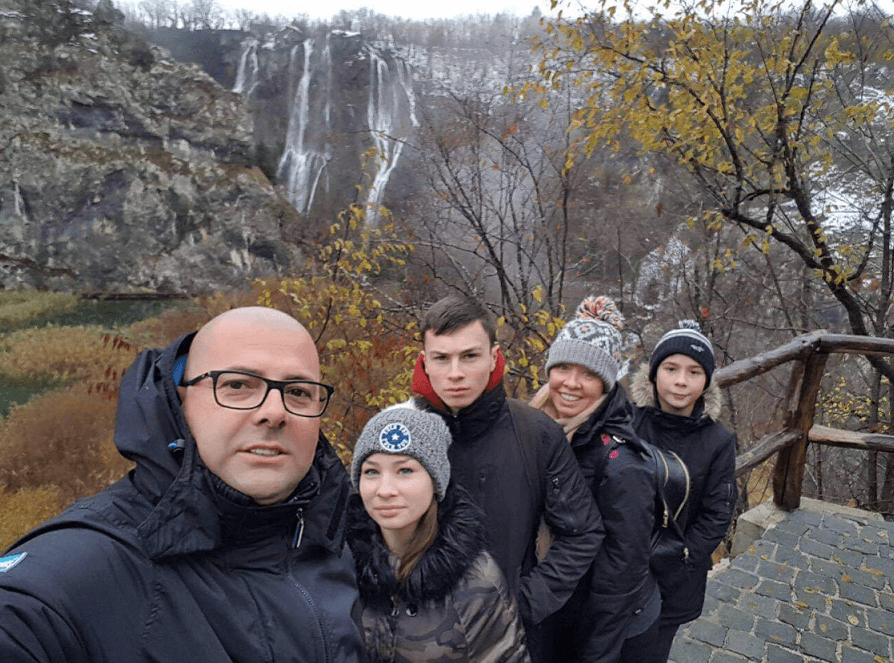
1. Let's start at the beginning. Tell us about your Croatian love and how did you meet?
I met my husband when we were teenagers (as friends), as I used to come out to Dubrovnik every summer when school finished to stay with my grandparents. At the time, our paths went in different directions. Some years later, with 2 kids and a husband at the time, our paths crossed again, one thing led to another, I got divorced… we entered into a long-distance relationship, had a son together, and after our wedding in 2011 me and the children decided to make the move to Dubrovnik.
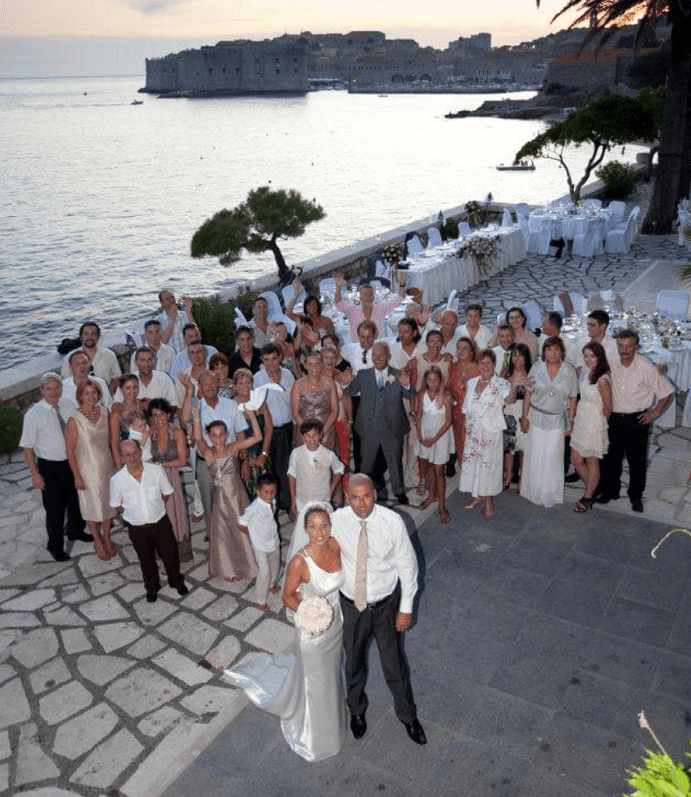
2. How much did you know about Croatia or Croatian culture before you met?
I knew a lot about Croatia and the culture due to my father being Croatian and having close contacts there.
3. Tell us about meeting the Croatian family for the first time.
This is something that I was dreading, as my in-laws were originally from a small village in Hercegovina but living in Dubrovnik. There were very old school, so to speak. But I was pleasantly surprised by how they accepted my 2 older children and me into their family, making me very welcome. My father-in-law used to give me a shot of Rakija every morning, and my mother-in-law was always trying to feed me. Sadly it's been 5 years since they passed away, and I miss them dearly.
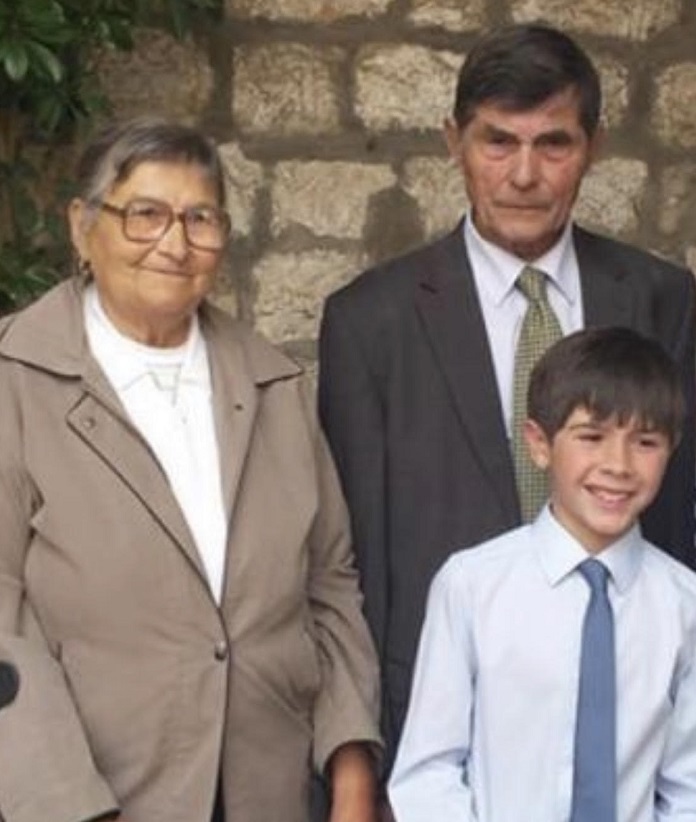
4. And, of course, the proposal and the wedding. Was it a big Croatian affair?
Due to us already having a son together we decided to have an intimate wedding with close friends & family (which was met with slight disapproval) at Hotel Excelsior in Dubrovnik, as we did not want to have the big Croatian wedding.
5. And you decided to move to Croatia! Was that an easy decision? What did your family say?
It wasn’t an easy decision as my children were settled in school in the UK, and I had friends and family I would miss, but they were happy for me. So I sold and packed up, and we all went off to Dubrovnik with dog in tow.
6. What were your perceptions and fears before you moved?
My worst fears were for my children having to leave there school and friends and start all over again in a new country with a new language, at the time, they were 6,11&13 years old, for my older two, it was a struggle at first, but eventually, they settled in well, although school was not easy.
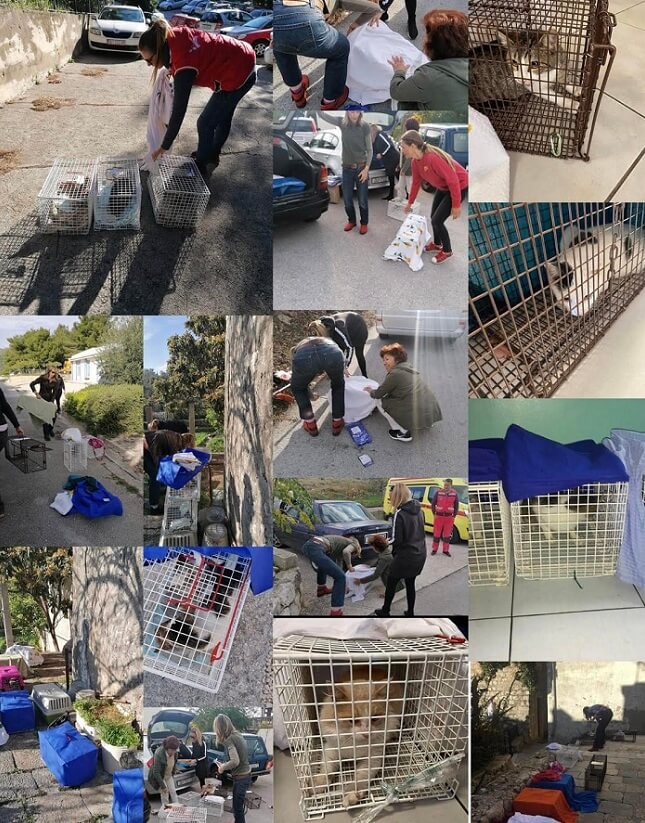
7. And tell us about life here. What do you love about living in Croatia, and what do you dislike?
For the children living here is great they have so much freedom, and i feel safe when they are out. I love the slow pace of life and the hospitality of people making you feel welcome. The weather is so lovely here in the summer, and the winters are mild. I love sitting on my terrace while drinking my English tea and looking out onto the harbour. Another thing I love doing is helping the street cats; I've got involved (volunteering) with a UK-based charity that helps the stray street cats of Dubrovnik and surrounding areas ie TNR (trap neuter release), feeding as well as other medical needs, taking to vets for treatment they might need. (SOS Dubrovnik cats) you can find them on Facebook. I now have 8 cats at home that I have taken in from the streets, although my husband kept telling me no more cats after each one or he would divorce me haha. He is still here, and so are the cats, Although he tries to give it the big macho Croatian, he fusses over them more than me (he will kill me for this).
People don't like to queue here and especially in the supermarket and banks. If I was given a kuna for every time someone pushed in telling me they would be late for their bus, I would be a millionaire!
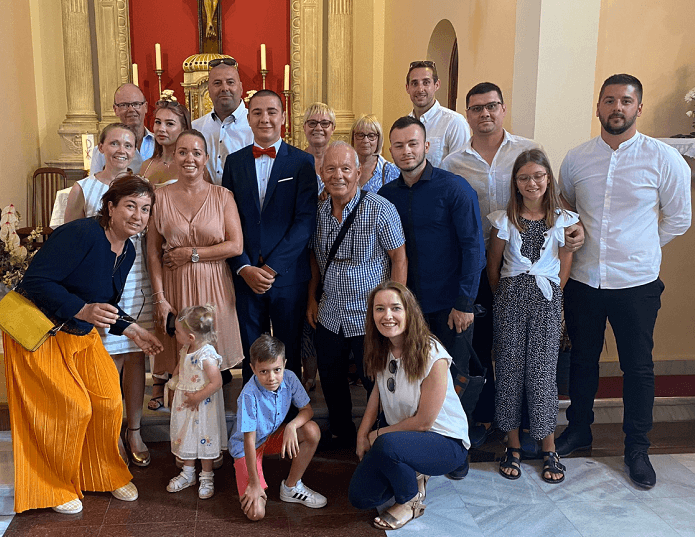
8. Without wanting to start any marital wars, any comments on being married to a Croat do you think? Are there any particular quirks, positive or negative that you have noticed?
I can’t speak for all Croatians, but my husband is very impatient but is also a very passionate person about things he believes in, ie football and his homeland. One of his annoying habits is to keep going on about “PROPUH”(a draft), although I think it's a normal thing here as everyone seems to think they are going to die from “PROPUH”, haha. I've learnt to ignore and carry on. He always seems to think he knows everything and doesn’t like to be told otherwise, which seems to be the case with most Croatian men. Everything is “Sutra cemo” (tomorrow), although I should point out that if it's something important, he will get things done. He is a great help around the house when I need it and is not afraid of the vacuum cleaner haha. He is also a fantastic father and gets on really well with my older two from my first marriage.
9. Your advice to anyone else thinking of moving into a Croatian family and relocating to Croatia?
For me, it was easy as I knew the culture and spoke the language. From observing other families here, my advice would be to not live with your in-laws. I did not have this problem but know of people who did.
I have no regrets about leaving the UK and am loving my life here. I do miss my family and friends back in the UK (and the shopping), but it's only a two-and-a-half-hour flight away.
PS If anyone is thinking of holidaying in Dubrovnik and requires airport transfers or private day trips, and would like to support a small family buisness , get in touch at - This email address is being protected from spambots. You need JavaScript enabled to view it.
Thank you x
****
Thanks, Emily!
Did you marry a Croat and move to Croatia? Want to take part in this series? Email This email address is being protected from spambots. You need JavaScript enabled to view it. Subject I Married a Croat.
What's it like living in Croatia, and where can you get the best survival tips? TCN CEO Paul Bradbury and TCN Editor Lauren Simmonds have teamed up to publish Croatia, a Survival Kit for Foreigners.
Follow Paul Bradbury on LinkedIn.

Fewer Croats Opting for Church Marriage
Ten years ago, something like this was utterly unthinkable. Croatia, as can be expected from a country in which 87 per cent of citizens declare themselves to be Catholics, was dominated by the church marriage. The bride and the groom would go to the altar and marry in the presence of parents, godparents, relatives, friends and a priest. Just like in movies, reports Slobodna Dalmacija on May 4, 2019.
At the time, two-thirds of marriages were concluded in churches, while a third of couples opted for a civil ceremony in town or municipal halls, where a registrar married them for 210 kuna.
But now the situation has changed completely. The number of church and civil marriages is practically the same. According to official records by the Ministry of Administration, in 2018, 10,230 couples married in a church, while 9,993 did in at a registrar office. Out of the total number of 20,223 marriages, church marriages represented just 50.59 per cent. The difference of only 237 marriages suggests that the current ranking of church and civil unions could soon change and that this year civil marriages could win over the ones concluded in a church.
According to Ivan Markešić, a sociologist of religion from the Ivo Pilar Institute, the reasons are mostly practical. “When a church marriage is concluded, if there is a split between the husband and the wife, the married person loses the right to receive sacraments, go to confession and enter into another marriage. They are completely excluded from the church life,” says Markešić. With civil marriages, the situation is entirely different. If the marriage breaks down and the spouses divorce, they can still go to the communion and receive other sacraments. And they can enter into a new civil marriage.
“Today, it is not a sin not to marry in the church or to have a divorce. So, why would people enter into a more complicated church marriage, when it is socially acceptable to be in a civil marriage and get a divorce. This is the logic that has obviously won. Marriages nowadays have something like a trial period, and civil marriages are more practical,” says Markešić.
He also points out another important element, which is part of the equation when the bride and the groom are persons of two different religions. “At the registrar, no one will ask you whether you are a Catholic, a Muslim or a Jew. But, when the church wedding is conducted in a Catholic church, the husband or the wife of another faith or atheist must sign a personal statement that the children will be brought up in the Catholic spirit. That is not the case with a registrar. Nobody demands that children must go to religion lessons or be baptised, and that certainly contributes to such a large share of civil marriages,” concludes Markešić.
There are substantial differences if we take a look at data by individual counties. Split-Dalmatia County is one of those in which church marriages still lead convincingly. Out of a total of 2,383 marriages in 2018, 1,394 were church marriages and 989 were civil. In this sense, the county is one of the fortresses of tradition.
In Zadar County, the number of civil marriages is very close to the number of church marriages. Out of a total of 738 weddings, 397 were done in churches, while 341 were civil. In Šibenik-Knin County, out of 475 marriages, church marriages lead by 270 to 205. In Dubrovnik-Neretva County, there were more civil marriages in 2018. Of the 812 weddings, 356 were church and 456 were civil.
Civil marriages also lead in Zagreb (2,007 vs 1,753), Istria County (557 vs 319) and Primorje-Gorski Kotar County (799 vs 460). Similar trends are also present in Sisak-Moslavina and Bjelovar-Bilogora counties.
Interestingly, the same is true for one of the most conservative parts of Croatia. In 2018, church marriages lost their battle against civil marriages in Lika-Senj County. Out of a total of 173 marriages, there were 86 church marriages and 87 civil marriages.
Translated from Slobodna Dalmacija (reported by Marina Karlović Sabolić).
More news about the Catholic Church can be found in the Politics section.
Globe-Trotting 1953 Pontiac from Canada Driving Newlyweds in Croatia
The car was brought to Croatia from Australia.
First British Royal Gay Couple to Honeymoon in Croatia?
Lord Ivar Mountbatten is the first member of the extended British royal family to enter into a same-sex marriage.
Croatian Wedding Photo Among Best in the World
A photo by Tomica Rašetina is one of the 50 best wedding photos in the world.
A Croatian Anti-Destination Wedding: Fjaka-Up Your Nuptials
Overwhelmed by the lumbering apparatus that is your wedding?
Here are a few pointers from a guy who hosted a sorta-big wedding on a small island.
[Or: how my now-wife and I tried to simplify the most important day of Our Lives.]
Croatia Promoted as Perfect Wedding Destination
ZAGREB, May 13, 2018 - The Rijeka-based wedding agency Wedding2Book has initiated cooperation with the German Agentur Traumhochzeit agency in order to promote Croatia as an ideal wedding destination.
Croatia in History: Traditional Wedding in Šestine, 1930 (Video)
Welcome to another Croatian history lesson: we're looking to Šestine in Zagreb for some facts about traditional courting and marriage... 'as it once was'
Weddings at Adriatic Lighthouses a Hit Among Couples
Croatia is becoming increasingly popular as a wedding destination. Ever thought about tying the know in a lighthouse?


